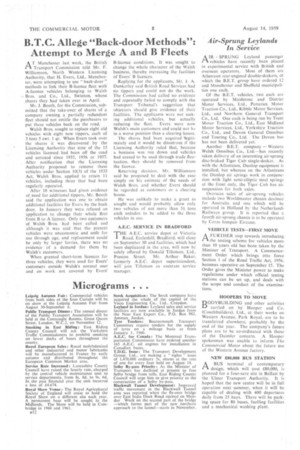B.T.C. Allege "Back-door Methods": Attempt to Merge A and B Fleets
Page 46

If you've noticed an error in this article please click here to report it so we can fix it.
Ar Manchester last week, the British Transport Commission told Mr. F. Williamson, North Western Licensing Authority, that H. Evers, Ltd., Manchester, were attempting to use " back-door" methods to link their B-licence fleet with A-licence vehicles belonging to Walsh Bros. and Co., Ltd., Swinton, whose shares they had taken over in April.
Mr. J. Booth. for the Commission, submilted that the take-over of shares of a company owning a partially redundant fleet should not entitle the purchasers to put these vehicles back on the road. Walsh Bros. sought to replace eight old vehicles with eight new tippers, each of 3 tons 5 cwt. 1 qr. When Evers took over the shares it was discovered by the Licensing Authority that nine of the 15 vehicles licensed had been off the road and untaxed since 1955, 1956 or 1957. After notification that the Licensing Authority proposed to remove these vehicles under Section 10(3) of the 1933 Act, Walsh Bros. applied to retain II vehicles, including three that had been regularly operated.
After 10 witnesses had given evidence of need for additional tippers, Mr. Booth said the application was one to obtain additional facilities for Evers by the back door, In January they were refused an application to change their whole fleet from B to A licence. Only two customers of Walsh Bros. had been called and although it was said that the present vehicles were uneconomic and unfit for use through age, and replacement could be only by larger lorries, there was no evidence of a demand for them by Walsh's customers.
When granted short-term licences for three vehicles, they were used for Evers' customers outside Walsh's normal user and on work not covered by Evers' B-licence conditions. It was sought to change the whole character of the Walsh business, thereby increasing the, facilities of Evers' B licences.
Replying for the applicants, Mr. J. A. Dunkerley said British Road Services had no tippers and could not do the work. The Commission had called no evidence and repeatedly failed to comply with the Transport Tribunal's suggestion that objectors should give evidence of their facilities. The applicants were not seeking additional vehicles, but actually reducing the fleet. Evers were now Walsh's main customers and could not be in a worse position than a clearing house.
The shares had been acquired legitimately and it would be disastrous if the Licensing Authority ruled that, because a business was run down and vehicles had ceased to be used through trade fluctuation, they should be removed from the licence.
Reserving decision. Mr. Williamson said he proposed to deal with the case simply on his estimate of the needs of 'Walsh Bros. and whether Evers should be regarded as customers or a clearing house.
He was unlikely to make a grant as sought and would probably allow only two vehicles of not more than 3+ tons each unladen to be added to the three vehicles in use.
A.E.C. SERVICE IN BRADFORD
THE A.E.C. service depot at Victoria Road. Eccleshill, Bradford. will close on September 30 and facilities, which had been duplicated in the area, will now be solely offered by Oswald Tillotson. Ltd., Preston Street. Mr. Arthur Baker. formerly A.E.C. depot superintendent, will join Tillotson as assistant service manager.




















































































































